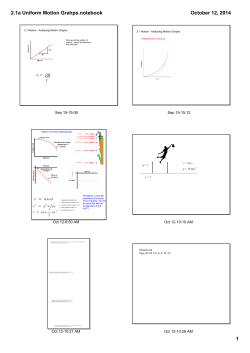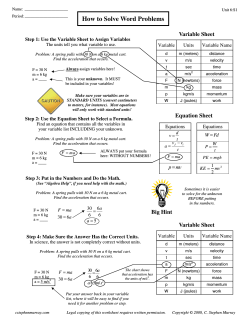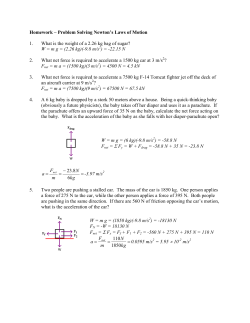
NFV Network and Compute Intensive H/W Acceleration
NFV Network and Compute Intensive H/W Acceleration NFV PoC (Proof of Concept) #21 http://nfvwiki.etsi.org/index.php?title=Network_Intensive_and_Compute_Intensive_Hardware_ Acceleration peter.ashwoodsmith@huawei.com (presenter) evelyne.roch@huawei.com (contact for info/join etc.) Very Briefly… • We want to bring to your attention an initiative to standardize or open source hardware acceleration mechanisms/APIs for NFV. • There are numerous advantages to hardware acceleration, performance, power, density, delay, jitter, security etc. • However proprietary hardware was the impetus for NFV, so how can we get the gains of hardware acceleration while staying true to the original goals of NFV? • Obvious answer is common APIs and to divide network functions into slow and fast parts around those APIs. • A good model is what happened with video graphics cards & math co-processors. (Device drivers etc.) 2 What we are doing • A group of vendors and service providers are building proof-of-concept demonstrations to explore these APIs/models. • The proof-of-concepts or POCs are based on use cases provided by service providers. • Multiple vendors then show different methods to accelerate these functions on common hardware with H/W acceleration techniques/cards etc. • The first such demonstrations were just given in Germany at the SDN/Openflow world congress. 3 Example Demos • Demos of HAproxy L7 load balancing acceleration were given. – Openflow++ was used as the API to cause splicing of TCP connections by adjacent H/W thereby avoiding the hops into and out of the CPU through the software LB. – A 25 x throughput gain at 90% reduced CPU was observed. • Demos of OpenSwan IPSEC acceleration were given. – Examples included the IKE Diffie-Hellman key exchange (ie huge number math) done in a NIC based FPGA and called from OpenSwan. – A 25x speed up in tunnel creation rate was observed. 4 Next Steps • Explore acceleration other VNFs – Video trans-coding. – Service chaining. – Others based on interest (i.e more SPs & more vendors). • Standardize protocol extensions OpenFlow ++ in ONF. – Protocol Independent/Agnostic additions for switches in NFV DC. • Standardize APIs for higher performance packet termination/compute/scanning etc. – Where to do this work? – Seems to make sense to do this in openNFV? 5 More Info • http://nfvwiki.etsi.org/index.php?title=Network_Intensive_a nd_Compute_Intensive_Hardware_Acceleration • http://www.poforwarding.org/ • http://www.eantc.de/fileadmin/eantc/downloads/test_reports /2014/EANTC-ETSI_NFV_PoC21-v3.0.pdf • ONF2014.451 OF PI: A Protocol Independent Layer • Or Contact: evelyne.roch@huawei.com 6
© Copyright 2025





















